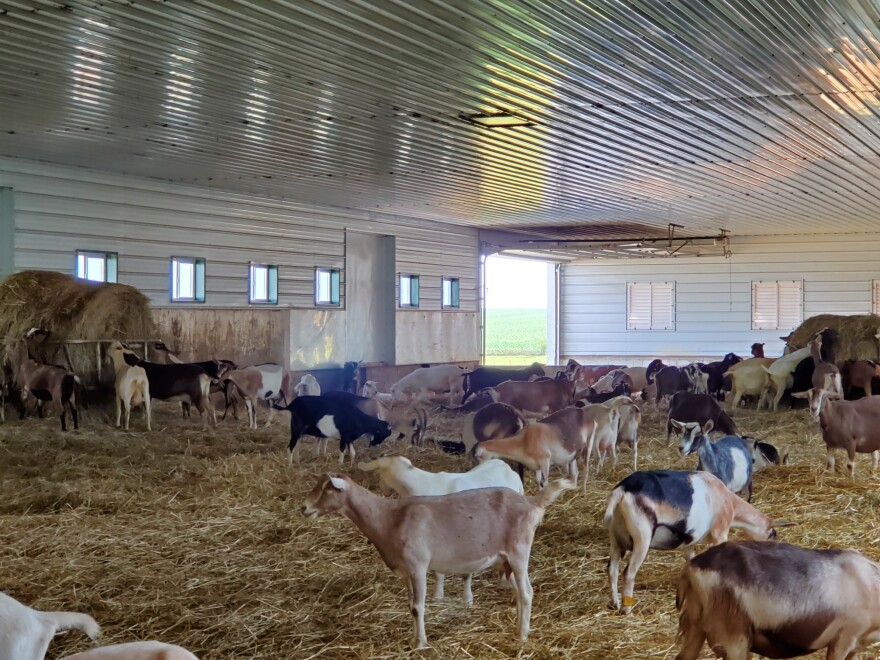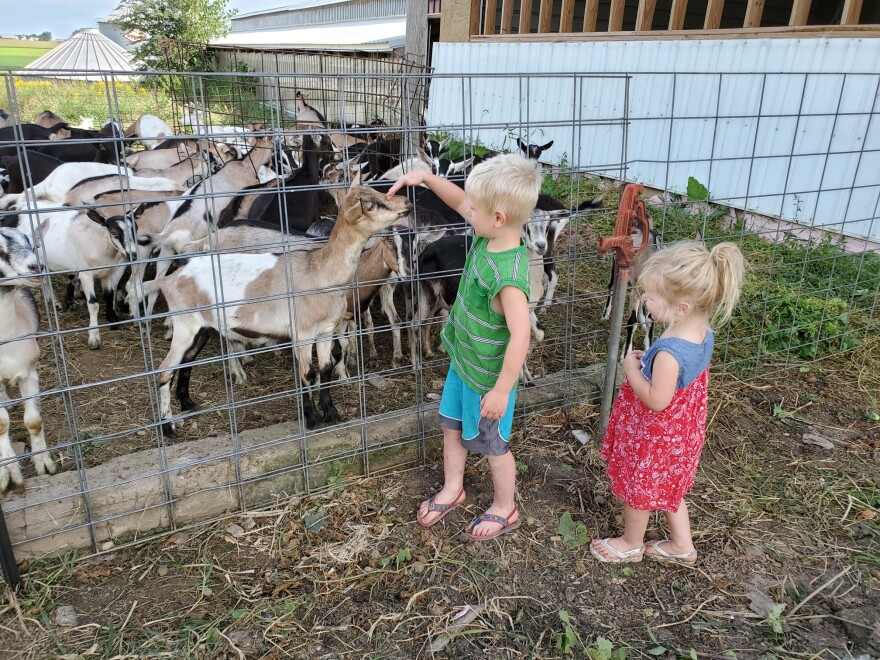On a warm September Saturday, David Shindelar is giving a tour of hisGrazing Goat Dairy in rural Chickasaw County.
“So we’re walking into the main entrance to the creamery where we have our little refrigerator with our product in there that people can come and buy and you can also see into our caramel making room," he said. "We have a little window for viewing and we also have another window where you can see into our milk processing room."
Shindelar, his family and a handful of part time employees milk 200 goats twice a day. They sell part of the milk to a cheese processor, Mt. Sterling in Wisconsin, and the rest stays here for the caramel sauce he mentioned as well as bottled milk and drinkable yogurt.
“We had to think of something to add value to the product we were already making because we didn’t want to increase the herd size, so coming up with the creamery was what we wanted to do and be able to raise our kids on the farm where I grew up," he said.

Shindelar left the family farm after high school to become a radiation therapist and in addition to the goat chores, he makes a 150-mile round trip for a shift at the Mayo Clinic for a three times a week. His wife Amanda is a part-time registered nurse. She said the family has a lot of experience juggling schedules
“When we were dating, they were milking a few goats and if I would be over to their house, I would help milk sometimes, so yeah, it was pretty early on, I knew this would be something I would be getting myself into," he said.
Outside the welcome center at the Grazing Goat Dairy, Bonnie Boyer and her family have made the 20-minute drive from Calmar.
“We are just checking out the goats, I brought my kids and the husband with to check out the products, something farm to home,” Boyer said.
Evidently, many Iowans like Boyer are interested in dairy goats and in a big way. While many bovine dairies are struggling due to low prices, Iowa is experiencing a rapid growth in the number of goat dairies. According to the USDA’s Census of Agriculture dairy goat herds expanded faster than any other major livestock group over the past decade, growing 61 percent between 2007 and 2017. That puts Iowa third in dairy goat numbers behind Wisconsin and Texas.

David Brown is Dairy Program manager for the State Department of Agriculture. He says Iowa currently has 217 licensed goat dairies turning out processed products like the Shindelars, but there are strict regulations for raw milk.
“If you’re going to sell any type of raw milk, because we do not allow the sale of raw milk in Iowa, it has to come from a permitted raw milk purchaser like Saputo Foods or Mt. Sterling in Wisconsin," Brown said.
Brown explains even though it's popular, goat milk needs to have a market it to get it off the farm, and that’s why only certain parts of the state have dairies.
“The Kalona area I think is our largest. I think there are roughly 78 goat farms down there and then we have cluster around the Colesburg area and then northeast Iowa, I think Guttenburg is where most of the farms are at. In northwest Iowa, we don’t have any farms out there because of hauling costs,” said Brown.
Brown said his office gets a handful of calls each month from Iowans who are considering adding milking goats to their farm
“When somebody calls into us, we suggest they contact Iowa State University," he said. "They offer you four hours of free discussion time with them and then they also give you a free booklet to help put your business plan together.”
The Shindelars’ got advice from ISU, and David’s father Allan said the family also spent many hours around the kitchen table discussing ideas.
“We’re doing this as a family to keep another generation on the farm. We put everything on the line, all the savings we’d put away for retirement got put in here," Allan Shindelar said. “We just felt it’s for the next group and we’re happy with that.”
That so-called next group -- David and Amada’s children -- represents five generations of Shindelars on the farm, three generations milking goats.


